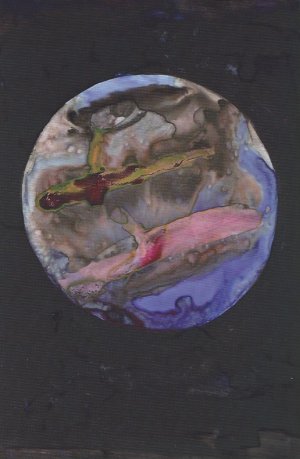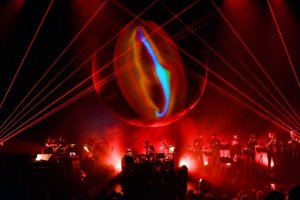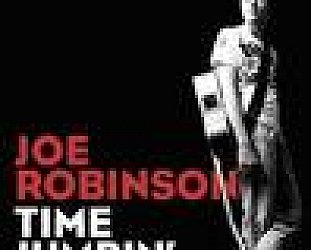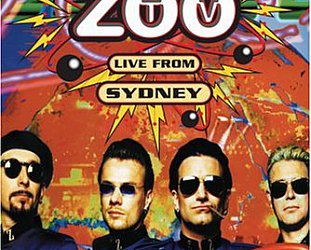Graham Reid | | 3 min read
Kuiper Belt

Elsewhere is of the firm opinion that the education system has failed young people if, by the age of 15, they haven't been introduced to some Shakespeare (Julius Caesar is an easy sell to teens), Picasso/Cubism and some start-off classical music (Young Person's Guide to the Orchestra, Peter and the Wolf perhaps?).
These are things in the arts which extend across all cultures – along with much more, of course – and open young eyes, ears and minds.
Into that Classical Music 101 we might also add Gustav Holst's The Planets which, although a century old, still has immense emotional power. It would be an odd kid who wasn't somewhat gob-smacked by Mars; The Bringer of War.
The thing about planets as a guiding concept in music – be it classical, a rock opera or the inspiration for a heavy metal guitar band – is that they can be explored either in an astronomical and scientific manner or an astrological and emotional bent.
Or, as Jimi Hendrix did with Third Stone from the Sun (that would be Earth, right?) just spin out into some free-form style which is right up there with Holst's Mars in the gob-smacked territory.
However if you are going to write about the planets these days then do you include Pluto? It was controversially dropped from planet status some years ago when astronomers discovered a whole swag of objects in the same orbit and of not dissimilar size which became called the Kuiper Belt.
 The
four hip musicians here – Sufjan Stevens, Bryce Dessner (from the
National and many other innovative side projects), with contemporary
classical composers Nico Muhly and James McAlister, the latter on
synths and drums too – have neatly sidestepped the Pluto conundrum
by also having a piece entitled Kuiper Belt . . . and have extended
their reach into Halley's Comet, Moon, Tides, Black Hole and a 77
second piece In The Beginning which suggests not so much a Big Bang
but a holy moment of ambient noise from which the cosmos emerged.
The
four hip musicians here – Sufjan Stevens, Bryce Dessner (from the
National and many other innovative side projects), with contemporary
classical composers Nico Muhly and James McAlister, the latter on
synths and drums too – have neatly sidestepped the Pluto conundrum
by also having a piece entitled Kuiper Belt . . . and have extended
their reach into Halley's Comet, Moon, Tides, Black Hole and a 77
second piece In The Beginning which suggests not so much a Big Bang
but a holy moment of ambient noise from which the cosmos emerged.
Given the scope explored here it's rather stating the obvious to say this 75 minute concept – which comes across two vinyl records with framable artwork, lyric sheet and a download – is written large and on the ambitious side.
For some it might hark back to the days of Yes concept albums, but where something like Tales from Topographic Oceans hasn't aged well musically or lyrically, you suspect the accumulated and diverse wisdom behind this might allow it to sound just as impressive in decades to come.
Although at no time could you hear this given Holst a run for his money.
The (music) stars have created one almighty stoner album for sure, but God here is in the details rather than the grand sweep which can sag at times when it devolves into ambient music (deja-heard) or the brevity of some pieces (Halley's Comet and Black Hole about 30 seconds of inconsequential spacey drone) don't require or allow them to grip.
But there's also some humour on display, as on the gently whimsical Kuiper Belt which effectively evokes those whirling planets out there around Pluto as imagined in some episode of Space Family Robinson perhaps.
Most attention falls on the big picture stuff however like the seven minute Jupiter which seems to lose direction by the midpoint and gets increasingly hippie-prog; and Mars which broods its way into angular hip-hop beats and more over-used vocoder “In the future there will be no more . . .”
Regrettably neither of these possess the gravitas they might have, and throughout it is Stevens lyrics – sometimes obscure, at other times opaque, often annoyingly processed – which intrude and haul this back.
 However
the opener Neptune does seduce the listener in with its grandeur;
Pluto approaches an Anglo-pop pastoral pop piece which is rather
lovely and comes over all string-enhanced and astrally Romantic; the
dreamy Venus with its sexual currents will find a home in prog
households; Uranus has an interesting and crackling substructure
alongside its gentle sweeps behind Stevens' airy vocals and aims for
mini-epic status . . .
However
the opener Neptune does seduce the listener in with its grandeur;
Pluto approaches an Anglo-pop pastoral pop piece which is rather
lovely and comes over all string-enhanced and astrally Romantic; the
dreamy Venus with its sexual currents will find a home in prog
households; Uranus has an interesting and crackling substructure
alongside its gentle sweeps behind Stevens' airy vocals and aims for
mini-epic status . . .
Black Energy is the standout, a kind of evocative/2001 sonic landscape of monochromatic but textured drone which has a real sense of weight and purpose.
Originally this was conceived and performed as a live show with other musicians in attendance and of course the obligatory (and arguablly necessary) visual diversions of a light show.
And that would be how it is best enjoyed, an experience live with pictures. On a purely musical level, well . . .
Although this doesn't have the grandeur its participating stars might have aimed for or believe it possesses, we remind ourselves of something the philosopher Sylvester Stallone once said with cunning ambiguity: “A star is just a big ball of gas”.





post a comment